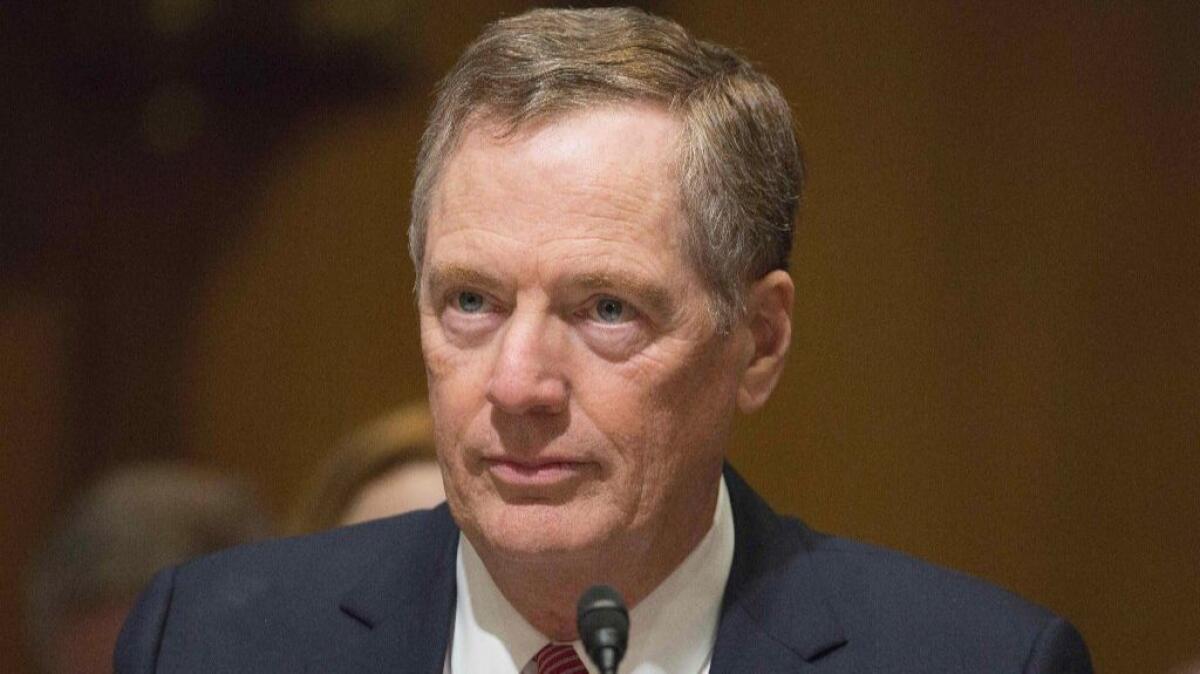Senate approval of Trump’s trade chief could speed up NAFTA talks

- Share via
Reporting from Washington — The Senate on Thursday signed off on President Trump’s nominee to become the nation’s chief trade representative, ending more than four months of delays that the administration blamed for slowing its initiatives on trade, including efforts to renegotiate the North American Free Trade Agreement.
There was never much doubt that Robert Lighthizer, a seasoned trade lawyer and former White House trade negotiator and Senate staffer, would win confirmation to be the U.S. Trade Representative. And when the Senate finally got around to voting, he was approved 82 to 14, making him one of the most easily confirmed among Trump’s picks but also the last of his Cabinet members to be seated.
The Trump administration had complained about the delay, which was partly related to Lighthizer’s past work as a private attorney representing a foreign country in a trade case.
With Thursday’s vote, Trump’s trade-team leadership is in place. Lighthizer is expected to work closely with Commerce Secretary Wilbur Ross. Economist Peter Navarro also is serving as a trade and manufacturing policy advisor.
The question now is how quickly will the Trump administration act on revamping NAFTA and the rest of the president’s agenda on trade?
And how much will Lighthizer sway the balance of power in the White House, between the so-called economic nationalists on one side, like Navarro who has advocated protectionist policies, and the more traditional GOP free-traders on the other, led by Gary Cohn, the former Goldman Sachs president who is Trump’s director of the National Economic Council.
“There’s definitely a new dynamic now,” said Nate Olson, a trade specialist at the Stimson Center think tank. But it won’t be an easy spot for Lighthizer, he added.
“He’ll have their backing as the statutory lead on trade negotiations, but he’ll also be the one in the hot seat as Congress demands a coherent policy and concrete progress,” Olson said.
The U.S. trade representative has traditionally been the lead negotiator on trade deals. Although Navarro and Ross have made the rounds on Capitol Hill, the White House has yet to provide the required 90-day notice to Congress before the U.S. can begin renegotiations on NAFTA. Ross has said that delays in confirming Lighthizer’s appointment had not helped the process.
Lighthizer, who served as a deputy trade representative in the Reagan administration, said during the confirmation hearing that he agrees with Trump’s “America First” policy.
During the hearing and in previous public comments, Lighthizer also has advocated stronger U.S. action to thwart unfair trade practices, particularly involving China.
“If you look at the trade deficit as an indicator — not the only indicator but an indicator — China is a good part of our problem,” Lighthizer said during the hearing in mid-March. “I think we have to engage China and we have to talk to China, but we also have to think about some new remedies.”
At the same time, trade experts who have worked with Lighthizer say that the 69-year-old is also a trade realist and that he would bring a more nuanced and technician’s approach to seeking better trade outcomes than what could be expected from the fiery rhetoric and antagonistic positions often espoused by Trump.
Trump announced his pick of Lighthizer for the post Jan. 3, but the vote was delayed in good part because some lawmakers argued that separate congressional action was needed to provide a waiver for Lighthizer for his past work representing a foreign government in a case involving a trade dispute with the U.S. Congressional Democrats insisted that GOP leaders extend health benefits for miners in exchange for the waiver.
The miners’ benefits and waiver were both part of the omnibus spending bill that passed last week. But on Wednesday, two Republican senators, John McCain of Arizona and Ben Sasse of Nebraska, sought to throw a last-minute wrench into the process, announcing that they would not support his nomination because of concerns about the nominee’s understanding of NAFTA and how renegotiations might hurt U.S. farm interests.
Lighthizer, however, received broad bipartisan support. The two senators from Ohio, Sherrod Brown, a Democrat, and Rob Portman, a Republican, issued a joint statement in support of Lighthizer after the vote.
“I just talked with Bob and I know he’s ready to get to work building a new trade policy that puts American workers first,” Brown said. Portman added: “Mr. Lighthizer is well-equipped for the task.”
Follow me at @dleelatimes
More to Read
Inside the business of entertainment
The Wide Shot brings you news, analysis and insights on everything from streaming wars to production — and what it all means for the future.
You may occasionally receive promotional content from the Los Angeles Times.











